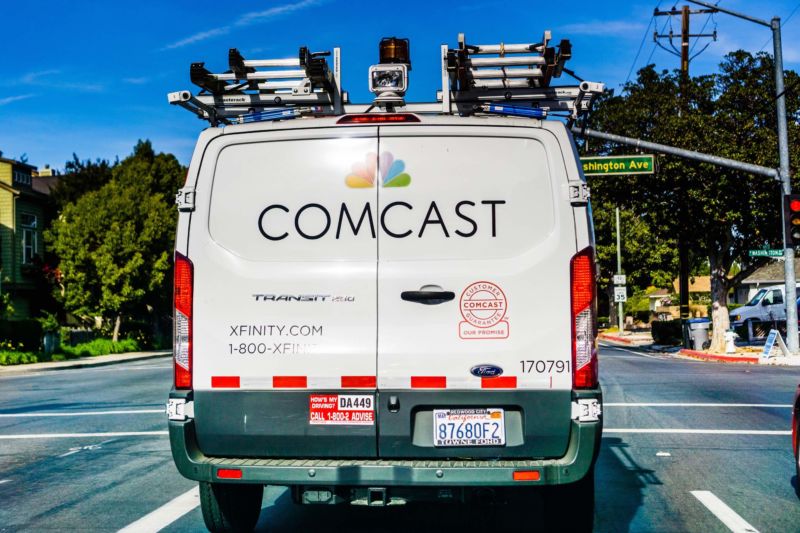
Dozens of state lawmakers from Massachusetts urged Comcast to halt enforcement of its 1.2TB monthly data cap, saying the cap hurts low-income people during the pandemic and is unnecessary because of Comcast’s healthy network capacity.
“Network capacity is not an issue for Comcast or a valid excuse to charge customers more,” 71 state lawmakers wrote in the letter last week, one day before Comcast brought its data cap to Massachusetts and other states where it wasn’t already enforced. “Comcast itself claims it has plenty of capacity across its network, including areas where no caps are currently imposed… It is inconceivable that Comcast would choose to impose this ‘cap and fee’ plan during a pandemic, when many Massachusetts residents are forced to work and attend school from home via the Internet.”
The letter said the lawmakers “strongly urge Comcast to discontinue this plan, and to reconsider any future attempts at imposing a data cap or any perversion of the principles of net neutrality in Massachusetts.” The lawmakers also pointed out a statement by Comcast executive Tony Werner, who said the increased broadband traffic caused by the pandemic “has all been within the capability of the network.”
In 2021, @Comcast plans to raise internet prices in Massachusetts. Yesterday, @RepDaveRogers & I partnered w/ 69 of our colleagues to strongly urge them to discontinue this plan & reconsider any future attempts at imposing a data cap. We most close, not widen the #digitaldivide. pic.twitter.com/okZixvnav0
— Andy X. Vargas (@RepAndyVargas) December 31, 2020
Comcast expanded its 1.2TB monthly data cap to its entire 39-state territory this month after four years of enforcing the cap in 27 of those states. Besides Massachusetts, newly capped areas include Connecticut, Delaware, Maryland, Maine, New Hampshire, New Jersey, North Carolina, New York, Pennsylvania, Vermont, West Virginia, and the District of Columbia.
More users exceeding 1.2TB per month
The letter to Comcast Senior VP Mark Reilly, spearheaded by Democratic state Reps. Andy Vargas and Dave Rogers, disputed Comcast’s claim that a 1.2TB cap only affects a very small subset of customers it calls “super users.” The lawmakers wrote:
Comcast claims that its planned data cap will only affect a handful of customers that are extreme data users, however, Internet consumers are using greater amounts of Internet data every year. In 2016, Comcast itself estimated that just 1 percent of customers used 1 terabyte of data or more a month. However, recent statements by Comcast indicate that five times as many customers are now exceeding its planned 1.2 terabyte threshold. Ongoing studies also show a growing number of consumers are exceeding these arbitrary caps, forcing them to pay unjustified overlimit fees or subscribe to a costly unlimited plan for as much as $30 more a month.
Comcast charges an extra $30 per month for unlimited data, or $25 for the “xFi Complete” add-on package that includes the Comcast gateway device and unlimited data. Customers who don’t upgrade to unlimited data and exceed the 1.2TB cap must pay $10 for each additional block of 50GB, up to a maximum of $100 each month. Comcast is phasing in the charges gradually, so customers in newly capped areas could start getting overage charges for their April 2021 usage.
Overage fees expand digital divide
Broadband affordability was a problem for low-income households even before the pandemic, and imposing data caps and overage fees will make it worse, the lawmakers told Comcast.
“Internet affordability is a growing concern that puts much-needed Internet service out of reach of low‐income citizens, many who are also from communities of color,” they wrote. “Entering the COVID-19 pandemic, nearly one-quarter of Massachusetts’ Gateway City households did not have a subscription Internet service at home. Additional fees and caps will only embolden the digital divide that exists for low-income households and communities of color in the Commonwealth.”
The lawmakers also wrote that “Massachusetts has experienced the largest relative increase of food-insecure individuals in the nation due to COVID-19, and has suffered some of [the] highest unemployment rates in the nation. The last thing our constituents need is to worry about paying more for the same quality of Internet service.”
Comcast does offer a $10 monthly Internet plan to qualifying low-income households, and the company has been praised by consumer advocates for improving and expanding the program during the pandemic. Comcast also temporarily waived its data cap due to the pandemic starting in March 2020 but reinstated the cap in July.
“A very small percentage”
We contacted Comcast about the letter today and will update this article if we get a response. Comcast provided a statement to WCVB, a local news station, reiterating its stance that the cap affects only “a very small percentage” of customers “because 1.2TB is a massive amount of data.”
“Our data plan is structured in a way that the very small percentage of our customers who use more than 1.2TB of monthly data and generate the greatest demand for network development and capacity pay more for their increased usage. For those super users, we have unlimited data options available,” Comcast said. Comcast also pointed out that it is giving 60 days of free service to new customers who qualify for the low-income program, that it is “waiving the requirement of not having back debt due so more families can apply,” and making Wi-Fi hotspots available to the public for free.
